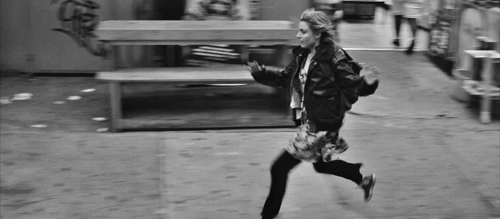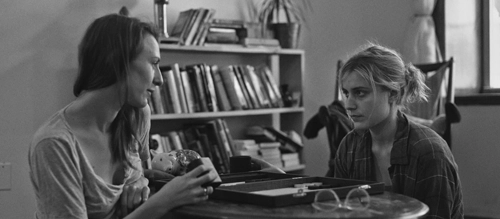‘Frances Ha’ at 10 – Review

Frances Ha (2012)
Director: Noah Baumbach
Screenwriters: Greta Gerwig, Noah Baumbach
Starring: Greta Gerwig, Mickey Sumner, Adam Driver, Michael Zegen, Michael Esper, Charlotte d’Amboise, Grace Gummer
Frances Ha will strike differently in different seasons of life. A teenager might find the titular Frances (Greta Gerwig) insufferable. She does, to be fair, lament about being “poor” as she rockets around the streets of Manhattan, and she has a way of turning any situation into a story in which she is the main character. But, if you’ve suffered through your twenties, Frances Ha is gratingly relatable.
Directed by Noah Baumbach (Marriage Story, White Noise), Frances Ha follows a group of 27-year-olds who fight to make meaning of their dead-end jobs, toxic friendships, and meandering relationships. Frances is an aspiring dancer who struggles to rise through the ranks of her company. What she lacks in talent, she makes up for in spirit. Throughout the film, we see Frances bounce between elated romps through New York City to depression days burrowed on the coach, worried about rent.
Though released several years earlier, Frances Ha functions as the prelude and epilogue to Greta Gerwig’s solo debut as director, Lady Bird (2017). In Lady Bird, a spunky high schooler named Christine (dubbed Lady Bird by herself), wishes for nothing more than to make it to the mythical East Coast––“where writers live”, she explains to her mother. In Frances Ha, we are on the East Coast following a struggling Frances. While the city never loses its whimsy, there is a distinct shift in how the character (whom, like Lady Bird, we have come to understand represents Gerwig) sees her sense of place.
Frances does feel a sense of freedom in the city. One of the best moments of the film comes when Frances sprints through the streets of Chinatown, twirling, dancing, and screaming with glee while “Modern Love” by David Bowie blasts in the background. It is the kind of loaded, complicated joy that comes with your twenties. It is balancing the small victories with the friendship dramas, money problems, career failures, and moving troubles. Unlike Lady Bird, Frances is unable to leave her problems in Sacramento in favor of the clean, gleaming, fresh-start city.
If Lady Bird is a movie about strained maternal relationships and coming to terms with your hometown, Frances Ha is about leaving and learning to live independently. We watch Frances cling to her best friend Sophie (Mickey Sumner) who is “just like [her] with different hair” despite their many growing pains. Though the two clearly love each other and might be soulmates, their vastly different goals and ambitions complicate their relationship. They fight, make up, move out, scream, and leave voicemails all in the span of eighty-five tight minutes. Sophie is a tether to the adult world for Frances. She is grounded and reasonable, and the two can always share a laugh and a beer at the end of the night.

One of the best things about Greta Gerwig’s (and, in this case, Baumbach’s) writing is the willingness to delve into the complexities of female relationships. The film explores the undercurrents of competitiveness and jealousy in Sophie and Frances’ friendship without ever compromising on the idea that the two are loving friends trying their best. We don’t hate Sophie even when Frances does, and we can’t help but to love Frances even when she makes yet another social faux pas.
The film holds up to modern standards in every way sparing one major drawback: its complete lack of racial diversity. Though entirely set in New York City, the world of Frances Ha revolves around a cast of white characters. While it might be interesting to dissect this social dynamic, the film fails to even mention the fact that every speaking character is white. In a community upturned by gentrification and displacement of its mostly black and brown residents, it feels tone-deaf to completely omit this major detail.
Frances Ha does an excellent job of understanding the inner workings of its central character. It uses stunning cinematography to capture Manhattan in all of its edges, creases, and curves. Though it falls short in painting the social dynamics at play in the city, it is a poignant watch for anyone undergoing major construction in their personal or professional life.
Score: 20/24
Recommended for you: Greta Gerwig: The Essential Collection

